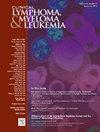Role of Pulmonary Function Tests to Predict Complications After Chimeric Antigen Receptor T-Cell Therapy
IF 2.7
4区 医学
Q2 HEMATOLOGY
引用次数: 0
Abstract
Background
Chimeric antigen receptor T-cell therapy (CAR-T) has transformed the treatment of certain hematologic malignancies, but toxicities limit efficacy. The role of pre-CAR-T pulmonary function testing (PFT) to predict toxicities is unclear.
Objective
Our aim was to examine the association between PFTs obtained prior to CAR-T and subsequent complications in patients with lymphoma.
Study Design
We conducted a retrospective study of patients who underwent standard-of-care CAR-T at our institution with pretherapy PFTs. Race-neutral normative equations from the Global Lung Initiative were used to generate percent-predicted values (PPV) for spirometry and diffusing capacity of the lungs for carbon monoxide (DLCO). Lung function score (LFS) was calculated by combining the forced expiratory volume in the first second (FEV1) and the diffusion capacity of the lung for carbon monoxide corrected for hemoglobin level (cDLCO) in an equally distributed manner, with higher score denoting worse lung function. Binary logistic regression models were used to compare the association of PFTs with complications after CAR-T. Cox regression models were additionally fit to identify predictors of mortality.
Results
Of 218 individuals who underwent CAR-T therapy, 66 had PFTs performed within 12 months prior to lymphodepletion. Higher LFS was associated with higher risk of CRS (OR 4.3, 95% CI, 1.4-29, P = .048), after adjusting for lines of treatment. When adjusting for lines of treatment, both FEV1 (OR = 0.96, 95% CI, 0.93-0.99, P = .05) and FVC (OR = 0.96, 95% CI 0.92-0.99, P = .03) are protective for ICANS. PFT abnormalities were not associated with early or late mortality.
Conclusion
The combination of pre-CAR-T spirometry and cDLCO may help clinicians understand the risk for toxicities after CAR-T cell therapy.
肺功能测试在预测嵌合抗原受体t细胞治疗后并发症中的作用
背景:嵌合抗原受体t细胞疗法(CAR-T)已经改变了某些血液系统恶性肿瘤的治疗方法,但其毒性限制了疗效。car - t前肺功能测试(PFT)在预测毒性中的作用尚不清楚。目的:我们的目的是研究CAR-T治疗前获得的PFTs与淋巴瘤患者随后并发症之间的关系。研究设计:我们对在我院接受标准CAR-T治疗的患者进行了回顾性研究。来自全球肺倡议的种族中性规范方程用于生成肺量测定和肺一氧化碳弥散能力的百分比预测值(PPV)。肺功能评分(LFS)由第一秒用力呼气量(FEV1)和肺一氧化碳弥散量校正血红蛋白水平(cDLCO)等分布计算,评分越高肺功能越差。采用二元logistic回归模型比较pft与CAR-T术后并发症的关系。此外,还拟合Cox回归模型以确定死亡率的预测因子。结果:在218例接受CAR-T治疗的患者中,66例在淋巴细胞清除前的12个月内进行了pft。在调整治疗线后,较高的LFS与较高的CRS风险相关(OR 4.3, 95% CI, 1.4-29, P = 0.048)。当调整治疗线时,FEV1 (OR = 0.96, 95% CI, 0.93-0.99, P = 0.05)和FVC (OR = 0.96, 95% CI 0.92-0.99, P = 0.03)对ICANS具有保护作用。PFT异常与早期或晚期死亡无关。结论:CAR-T前肺活量测定和cDLCO的结合可以帮助临床医生了解CAR-T细胞治疗后的毒性风险。
本文章由计算机程序翻译,如有差异,请以英文原文为准。
求助全文
约1分钟内获得全文
求助全文
来源期刊

Clinical Lymphoma, Myeloma & Leukemia
ONCOLOGY-HEMATOLOGY
CiteScore
2.70
自引率
3.70%
发文量
1606
审稿时长
26 days
期刊介绍:
Clinical Lymphoma, Myeloma & Leukemia is a peer-reviewed monthly journal that publishes original articles describing various aspects of clinical and translational research of lymphoma, myeloma and leukemia. Clinical Lymphoma, Myeloma & Leukemia is devoted to articles on detection, diagnosis, prevention, and treatment of lymphoma, myeloma, leukemia and related disorders including macroglobulinemia, amyloidosis, and plasma-cell dyscrasias. The main emphasis is on recent scientific developments in all areas related to lymphoma, myeloma and leukemia. Specific areas of interest include clinical research and mechanistic approaches; drug sensitivity and resistance; gene and antisense therapy; pathology, markers, and prognostic indicators; chemoprevention strategies; multimodality therapy; and integration of various approaches.
 求助内容:
求助内容: 应助结果提醒方式:
应助结果提醒方式:


